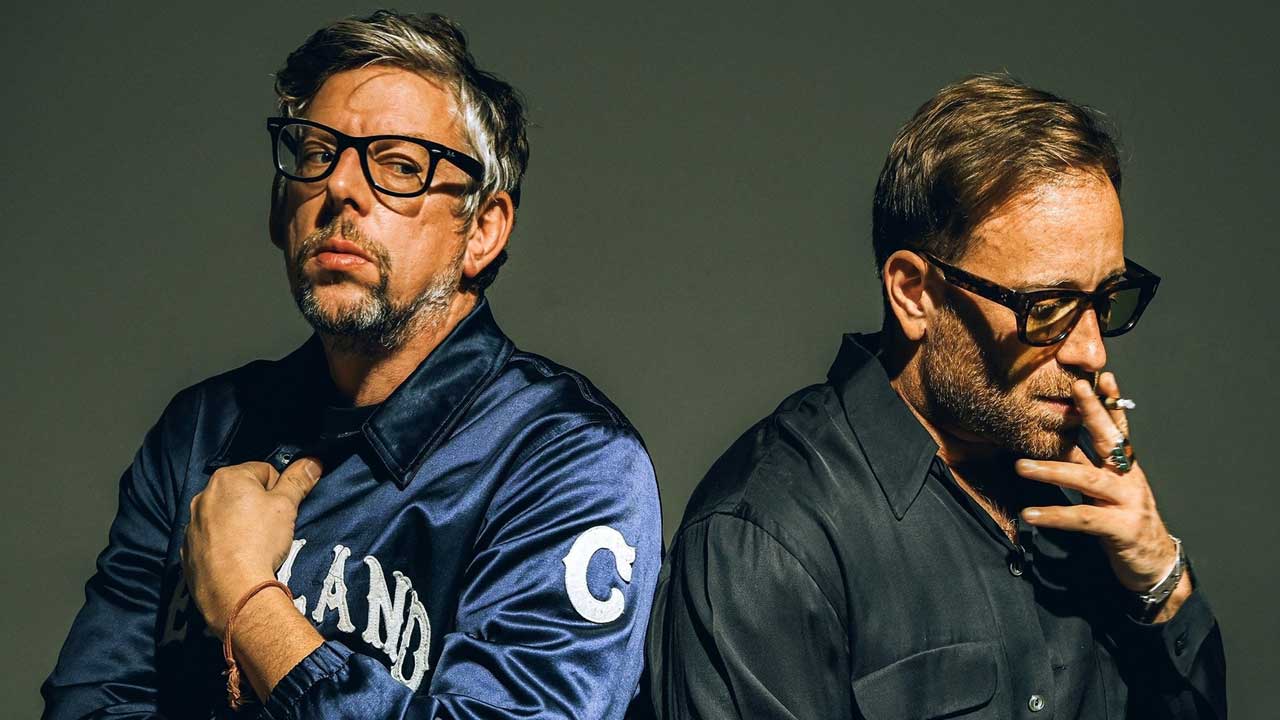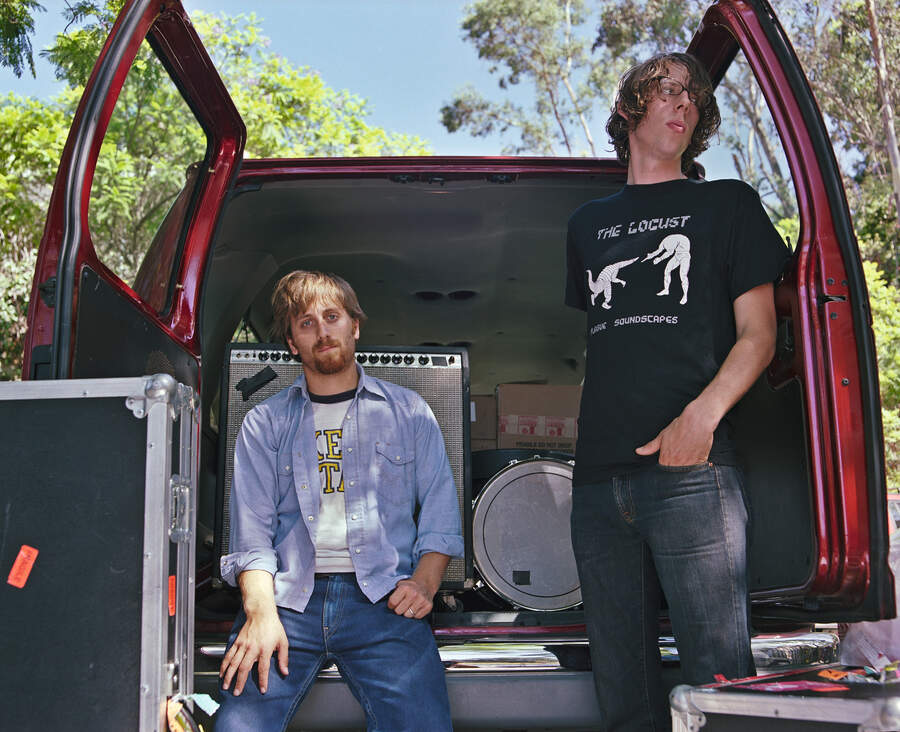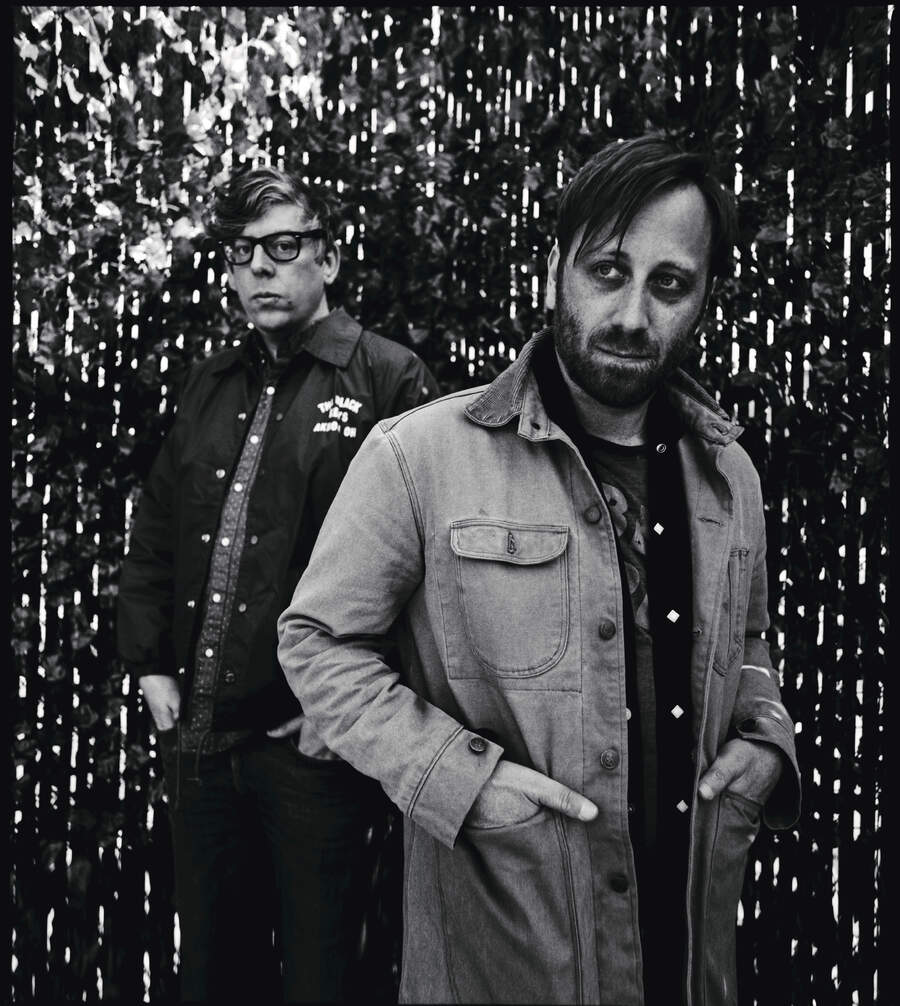
Being the biggest band in the world is overrated, reckons Black Keys frontman Dan Auerbach. Being the happiest one is where it’s at, offers drummer Patrick Carney. The Ohio alt.blues duo speak from hard-won experience. Now, a decade down the road from their four-year run of platinum sales, Grammy awards, burnout and premature greying (we’ll get to all that), twelfth album Ohio Players is the sound of rock stars enjoying their jobs again.
“There’s this thing that happens when you become a middle-aged rock’n’roller,” says Carney. “You’re supposed to become this kind of sullen, introspective, depressive person. But Dan and I, we had this kind of ‘aha!’ moment. We realised we needed to go and do some fun shit together, and it’ll come through on the record. Like, let’s do all the things that twenty years from now we’re gonna want to remember. We can do all this bullshit, and no one is gonna suggest it to us.”
Featuring hook-ups with friends and heroes – from Beck to Noel Gallagher – recorded in studios around the world, and with the pair breaking up the sessions by spinning vinyl at raucous DJ parties and hanging out together at ritzy hotels, Ohio Players is a record with joy in the grooves. To check its pulse, try lead single Beautiful People (Stay High), a spring-heeled hit of gritty white-boy soul. Or This Is Nowhere, a driving dirty-funk gem that practically orders you onto the dancefloor.
“That’s the true test,” says Auerbach. “Y’know, you think you’ve got a good record, then you play it on the dancefloor and it’s a fucking stinker. At our DJ shows, we were getting so picky about what we were spinning, and then that kind of trickled over into the making of this record. Like, it’s got to feel like a hit that you’ve never heard before, or it’s not good enough.”

Auerbach and Carney choose to do today’s Zoom calls without webcams, but scanning their press shots it’s striking how similar they now look – both mid-forties men in thick-rimmed, Clark Kent spectacles, equally awkward in front of the camera. It’s strange, because the story goes that they couldn’t have been more poles-apart when they fell into each other’s orbit at Akron’s Firestone High School in the mid-90s.
“I was sporty, Pat was in bands and shit, he was definitely extra-quirky,” says Auerbach. He laughs at a memory: “I remember walking past Pat one day and he had his head shaved, with these Buddy Holly glasses on, and he was just dragging his head along the lockers. It was making this sound, like, ‘RRRRRRRRR!’”
Never mind appearances, back then Auerbach and Carney came from very different shades of the musical spectrum. Guitarist Auerbach came from an artsy background, and found himself pulled in by the rough diamonds in his dad’s blues vinyl. Around the same time, the Mississippi-based Fat Possum record label sparked an obsession with warts-and-all bluesmen like R.L. Burnside, Junior Kimbrough and T-Model Ford.
“I loved the aesthetic of those records,” he says today. “I loved the fucking irreverent way they were recorded. I loved the stories, the lives these people lived. These weren’t old blues records and they weren’t dead guys. These were guys who were alive, and they were coming to Cleveland, playing the rock clubs. So I was intrigued beyond belief. I would drive for twenty-four hours just to see them play. The only person I didn’t see was Junior, because he was sick. I tried. I drove to Mississippi just to see him – sixteen hours – but I didn’t know he’d just had his leg amputated.”

When I interviewed Carney in 2011, told me he “hated” blues as a young man. Today he’s more measured: “If you look at the Venn diagram, Dan and I were coming to the same thing from different angles. I was into Beck and alternative rock like Modest Mouse, Pavement and Jon Spencer Blues Explosion – the Orange record [1994] specifically. Then the Blues Explosion made A Ass Pocket Of Whiskey [1996] with this guy R.L. Burnside, who I’d never heard of. That was the gateway drug. And that was right around the time Dan came to my house for the first time.”
The pair’s kid brothers had convinced them to jam. “I’d lied about my age to get a job washing dishes and was making five bucks an hour,” says Carney. “So I bought a 150-dollar drum set, a bass and a four-track recorder, all the gear you need to start a band. I’d never had a drum lesson, but I could do a stupid little surf beat. The only time I played drums was when someone came over who was better at guitar than me. When Dan plugged in his little Peavey amp, it was clear. Instantly, he had these blues licks and I was floored. Then I saw him play in this bar band, The Barnburners. The other guys were kind of dorks. But his voice and guitar playing were fucking phenomenal. I was like: ‘Shit, we could do something cool together.’”
If you’d been at those earliest Black Keys shows of 2001 – and, let’s be honest, there was no competition for tickets – you’d have heard the first stirrings of the raggedy push-and-pull that marked this band out in a post-millennial market already dominated by glossy, quantised pop.
“I swear to God,” admits Carney, “I didn’t realise the drums were meant to be even-keeled, tempo-wise, until we started working with [producer] Danger Mouse on 2008’s Attack & Release. It never even crossed my mind. To me it was very fluid, and where the one, two, three and four [beats] landed seemed completely irrelevant, because it was just Dan and I, and we had this way of playing together where it could move like that.”
Inevitably, there were hard years in which Auerbach recalls the duo enduring “all manner of fuckery, driving through snowstorms, getting caught in lightning”. Even at their brokest, for years the Keys resisted licensing their music for corporate use – until they didn’t (it’s said their catalogue has featured in more than 300 films, TV shows, videogames and adverts). “I don’t even want to pretend like I know how this business fully operates,” shrugs the guitarist, who today runs the Easy Eye Sound record label. “Pat, on the other hand, is very talented at the business of music."
Sometimes lazily dismissed as a poor man’s White Stripes (including by Jack White himself), early Keys records like 2002’s The Big Come Up, 2003’s Thickfreakness, 2004’s Rubber Factory – literally recorded at an abandoned tyre manufacturing plant – and 2006’s Magic Potion sold comparatively. But two years later, Attack & Release made US No.14, and they were ready to step up when their ratty old 1994 Chrysler van finally choked. “I think we probably set it on fire and pushed it into the woods,” says Auerbach. “That’s a rock’n’roll van burial.”
Everything changed in 2010. The most tangible departure was the band’s relocation to Nashville. “In Akron, we were truly isolated,” reasons Auerbach. “I mean, we didn’t want to be a duo. At the start we had a guy playing bass, and he quit. He just stopped coming to practice. The reality of Nashville is that there’s an influx of people, and a lot of them are douchebags but a lot of them are not.
“This city allows me to live in a bubble,” Auerbach continues, “where I get to have my studio and cherry-pick all the city’s musical attributes. Y’know, if I need an engineer, there’s six thousand Pro Tools engineers in town. Or a string section, horns, pedal steel, songwriters – this town is full of them. I miss Ohio, the parks and the weather and my family. But it’s a hard place to park your money. I’ve owned a house there for fifteen years and it’s worth less than it was when I fucking bought it.”
By coincidence or design, with the move to Nashville came 2010’s more ambitious-sounding Brothers, the platinum-selling sixth album that includes some of the Keys’ best-loved tunes, including Tighten Up’s dog-whistle chop and the juddering jackboot stomp of Howlin’ For You. By the following year, they’d struck back with the equally hooky El Camino (it’s inconceivable that you haven’t heard the barbed-wire riffing of Lonely Boy, and the crazed fairground organ of Gold On The Ceiling will likely ring a bell, too, from the ad for Cobra beer).
But with global hits came live obligations, and it didn’t take long for the workload to take its toll. In early 2011, the band crossed out reams of their international tour diary (“We’ve been touring long enough to know when we’re about to hit our breaking point,” Carney said at the time). When they returned to the treadmill, both men grew fractious and homesick.
“My hair went grey during all that,” Carney says of those peak years. “I think every band that goes through a period like that, they end up having a struggle afterwards. It ultimately leads to bands breaking up and people killing themselves. I think it would have been very helpful if any musician who had been through it had given us a phone call, saying: ‘It’s okay to say no to stuff.’ But no one did. There was no guidance. No mentorship. No one to say: ‘Hey, slow down and make sure you’re having fun.’ In fact, you’re gonna get shit for doing that. So we were just like: ‘What the fuck is going on?’”
If you want to see how bad things got, the drummer adds, you should watch the band’s recently released documentary (the cunningly titled This Is A Film About The Black Keys). “There’s a lot of hairy moments. There’s one scene where it’s the beginning of the El Camino tour. It’s our first real headline arena show in the US – or anywhere. Dan doesn’t come to soundcheck and I’m just fucking losing it.”
What was it about that period that messed with your heads?
“Every morning,” Carney remembers, “it was like: ‘You’re playing the biggest show of your life today.’ For a year straight. I think if you’re a band that ascends quickly into huge shows, you don’t have the perspective to be freaked out by it. But we definitely had the perspective. Like: ‘Fuck, we’re headlining Coachella?’ By that point we’d already played Coachella five times, so it carried a lot of weight.”
“The problem was always overworking ourselves,” says Auerbach. “We were on the road too long. Running ourselves ragged. Gone from my daughter. And no one was gonna tell us to take a break. No one had our best interests in mind. It took us twenty years, but we finally found out; we don’t need to play every city, all the time.”
The duo released one last mega-hit – 2014’s US chart-topping Turn Blue – before tapping out to write, produce and guest for other artists, among other backroom roles. By the time the next Black Keys record arrived, 2019’s Let’s Rock, the circus had moved on, but Auerbach and Carney had their heads straight. Since then their work rate has ramped up again (they average a studio album a year), but these late-period releases feel more like an outpouring of creative energy than like a contractual obligation. “I’m addicted to it,” Auerbach admits.

Which leads us back to Ohio Players: a collection of tracks that have all the momentum of a garage-recorded first record, not an apparently pretty expensive twelfth one.
“We spent more time on Ohio Players than we did on Brothers, El Camino and Turn Blue combined,” says Carney. “We ended up with close to thirty songs, like, done-done. But then we started pulling off any song that felt a little too mid-tempo or sad, putting them in the vault. Like: ‘This is not what we want right now.’”
As for material that moves from string-draped soul covers (I Forgot To Be Your Lover) to the stalking synths of Everytime You Leave – not to mention the glam/rap of Candy And Her Friends – Auerbach says they just followed their noses. “We were raised on so much different music, we couldn’t possibly just do one style. I mean, I was brought up in a household that had bluegrass, Motown, Stax. But then at school there was rap and grunge. We just wanted to be carried away with the joy of creation in the studio. We didn’t want it to be rigid or pretend that you have to conform to some sort of box.”
Likewise, says Carney, the duo relaxed their policy of a skeleton staff. “Before, I think we kept The Black Keys pretty insular. But with Dropout Boogie [2022], we were like: ‘Shit, we have so many fucking friends that we can make music with.’ That changed the whole feeling on this record, too, rather than just us in the studio, grinding away. So we set our sights on Noel Gallagher and we flew to London – even though Dan hates to fly – and our whole MO was we’re gonna stay in the nicest hotel, have a bunch of fun together, then go into the studio with a rock legend, with zero material, and risk completely embarrassing ourselves.”
“We ended up calling Noel the Chord Lord, because he just would not stop until he was satisfied,” Auerbach picks up. “We wrote On The Game together, and basically, the CliffsNotes [study guide] on that song would be that everyone’s a whore for something. Pat and I were like: ‘On The Game? What does that mean?’ We didn’t know that phrase. And Noel was like: ‘It’s a prostitute, man’.”
It was on the flight home that the pair realised they’d pulled off not just the collaboration with the ex-Oasis leader, but also arguably the boldest album of their career.
“It was fucking stressful afterwards, thinking about what could have happened, and how we could have just fucking fell on our faces,” says Carney. “But that’s the whole thing with Ohio Players – it’s like, we were taking creative risks with this record.”
There is perhaps just one sticking point. These new tunes are so hooky, so immediate, so danceable. Aren’t you worried they’ll turn you into the biggest band in the world all over again?
“I don’t know if the world needs a couple of mid-forties guys to do that,” reasons Carney. “But we want this record to resonate with people. It’s really about demonstrating to younger bands that you can still be doing this in your forties and having fun. I didn’t see that when I was in my twenties and thirties. If I’d had a band to look at, then maybe when we were going through our peak it wouldn’t have felt so frantic, like, ‘This is our moment, and it’s just downhill from here.’ It’s not about getting a Grammy or selling out multiple nights at an arena. It’s about making something you’re really proud of.”
Ohio Players is out now via Nonesuch







